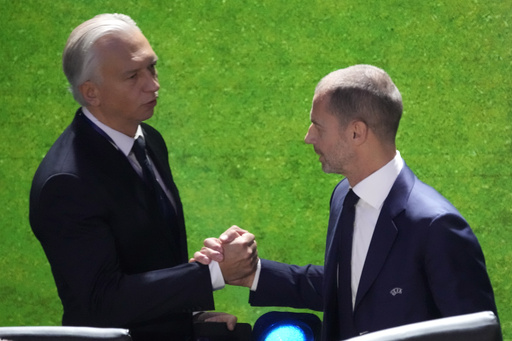GENEVA — Following upcoming elections in six weeks, Russia will relinquish its position on the influential UEFA executive committee.
Norwegian representative Lise Klaveness is the sole candidate for a newly created women’s quota seat, as announced by UEFA on Monday. Alexander Dyukov, the CEO of Russian oil giant Gazprom Neft, was notably absent from the candidate list shared by UEFA for the election meeting scheduled for April 3 in Belgrade, Serbia.
Dyukov secured a spot on UEFA’s ruling committee in 2021 and had previously indicated his interest in seeking an additional four-year term. His omission from UEFA’s electoral list came as a surprise, particularly in light of his recent re-election as president of the Russian soccer federation, a position he has held since 2019.
UEFA clarified that Dyukov did not submit an application to keep his seat on the executive committee, though he has not been deemed ineligible. All candidates wishing to be elected to the governing bodies of UEFA and FIFA must undergo essential evaluations by governance specialists.
Despite being on a British government sanctions list and the exclusion of Russian teams from international events following the invasion of Ukraine in February 2022, Dyukov continued to attend UEFA meetings and matches throughout Europe. FIFA and UEFA successfully argued at the Court of Arbitration for Sport shortly after the conflict began, claiming that including Russian teams would disrupt their competitions as several European nations refused to compete against them.
In light of the ongoing war, UEFA also terminated its sponsorship agreement with Gazprom in relation to the Champions League and relocated the 2022 Champions League final, initially scheduled to be held at the Gazprom-owned Zenit St. Petersburg stadium.
Dyukov represents the latest in a line of Russian soccer officials affiliated most closely with Zenit who have participated in UEFA and FIFA elections, a group that includes individuals like Alexey Sorokin, who organized the 2018 World Cup, former sports minister Vitaly Mutko, and Sergey Fursenko.
Klaveness is poised to join the UEFA executive committee in April, two years after losing in prior elections against male candidates. UEFA made the decision last year to broaden its executive committee from 20 members and to add a second quota seat for women. According to UEFA, Klaveness is the only candidate slated to take the position alongside Laura McAllister of Wales, who currently serves as a UEFA vice president.
During the meeting in Belgrade, UEFA’s 55 member federations will vote on nine additional male candidates for the executive committee. Notable new candidates include Andrii Shevchenko, the legendary AC Milan player who now presides over the Ukrainian federation, as well as Pedro Proença from Portugal, who officiated during the finals of the men’s European Championship and the Champions League in 2012.
Shevchenko is one of five contenders vying for two seats on the UEFA executive committee, both of which offer two-year terms. Meanwhile, Proença is one of 11 men campaigning for seven positions that come with a full four-year mandate.
As per the latest financial report, each ordinary member on the UEFA ruling committee receives an annual salary of 160,000 euros (approximately $168,000), whereas vice presidents are compensated with 250,000 euros in 2023. UEFA president Aleksander Ceferin earned nearly 2.9 million Swiss francs (around $3.2 million) this year.
On April 3, UEFA member federations will also finalize five candidates for five available positions on the FIFA council for a four-year term. This includes Belgian soccer leader Pascal van Damme, who is vying for the seat allocated for women. FIFA provides an annual compensation of $250,000 for these council positions.


